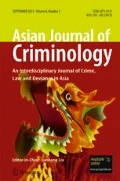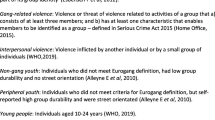Abstract
Singapore is well known internationally for its uncompromising stance towards law and order and its use of the death penalty in particular for murder and drug trafficking. Until 2012, it was one of the few countries in the world where the death penalty was mandatory for persons convicted of these two crimes. The law was amended in 2012 to give a judge the choice to impose the death penalty or life imprisonment (with caning) for non-intentional murder and drug trafficking in some situations. What do Singaporeans think of the use of the death penalty in their own country? This article reports on some findings of a survey conducted in 2016 on 1500 Singaporeans to assess their knowledge and support of the death penalty.
Similar content being viewed by others
Notes
A country could be retentionist in law but abolitionist in practice. The term “actively” retentionist is used to describe countries which have carried out at least one judicial execution within the last 10 years and have not subsequently announced a moratorium on executions.
It should be noted that not all of the 39 actively retentionist countries carry out executions regularly and those who do may execute less than 10 a year.
The figures do not include executions in China which is unknown.
For terrorist crimes.
Singapore was also a party to the various note verbale opposing the moratoriums. In 2016, Singapore led a small group of countries to introduce an amendment to the text of the General Assembly resolution to reaffirm state sovereignty.
He was quoted as saying, “Penalties and criminal laws can only be enforced if people believe that they are fair and that certain conduct ought to be made criminal …. Otherwise they lose credibility”.
Notably, the Minister said in Parliament that (at para [70]), “… no Government glorifies in having the death penalty or imposing it on anyone. …We are not dogmatic about this. We listen to arguments. We listen to people. We will listen to anyone with a good point of view, and we will make up our mind”.
This of course does not mean that Singapore’s criminal justice policy should be determined by public opinion alone. It is well known that France, Germany, the UK and Canada abolished the death penalty even though it was supported by a majority of the public at the time. See McGann and Sandholtz (2012) for an analysis of countries which are most likely to abolish the death penalty.
It can be argued that this apathy may be engendered by the Singapore Government. The number of executions per year was not officially available till 1991, and demographic details of the persons executed are still not publicly released.
Note that the percentages in the tables may not add up to 100% because of rounding of numbers.
However, it can be noted that median and mode responses for each of these offences were quite close to the actual figures.
It will be considered “more or less correct” if the respondent gave a figure between 7 and 19 in the case of murder, between 8 and 24 in the case of drug trafficking and between 2 and 4 in the case of firearms offences.
Penal Code (Chapter 224), ss 300, 302.
Misuse of Drugs Act (Chapter 185), ss 33, 33B. Although the survey distinguished the offences—in accordance with the law—in terms of the drug (heroin, cocaine, methamphetamine, cannabis and opium) and the amounts trafficked, the difference in responses was very minor (≤ 1%). The results are taken from questions relating to persons convicted of trafficking 15 g or more of heroin and reported collectively as “drug trafficking offences” in this article.
Arms Offences Act (Chapter 14), ss 4, 4A. These offences are described as “firearm offences” in this article.
Note that the figures reported exclude those who are already against the use of the death penalty, so the total proportion who support the death penalty is in fact smaller.
Note that the figures reported exclude those who are already against the use of the death penalty or are in favour of the discretionary death penalty, so the total proportion who support retaining the mandatory death penalty is in fact smaller.
References
Amnesty International. (2004). Singapore: the death penalty—a hidden toll of executions. Amnesty International. https://www.amnesty.org/en/documents/ASA36/001/2004/en/. Accessed 11 Sept 2017.
Amnesty International. (2016). Death sentences and executions 2015. Amnesty International. https://www.amnesty.org/en/latest/research/2016/04/death-sentences-executions-2015/. Accessed 11 Sept 2017.
Amnesty International. (2017). Death sentences and executions 2016. Amnesty International. https://www.amnestyusa.org/reports/death-sentences-executions-2016/. Accessed 11 Sept 2017.
Bae, S. (2008). Is the death penalty an Asian value? Asian Affairs, 39(1), 47–56.
Bakken, B. (2013). Capital punishment reform, public opinion, and penal elitism in the People’s Republic of China. In R. Hood & S. Deva (Eds.), Confronting capital punishment in Asia: human rights, politics and public opinion (pp. 187–204). Oxford: Oxford University Press.
Balakrishnan, V. (2016). Intervention at the high-level side event at the UN General Assembly, “Moving away from the death penalty: victims and the death penalty”. https://www.mfa.gov.sg/content/mfa/media_centre/press_room/pr/2016/201609/press_20160922.html. Accessed 11 Sept 2017.
Bohm, R. M. (1990). Death penalty opinions: a classroom experience and public commitment. Sociological Inquiry, 60(3), 285–297.
Bohm, R. M. (1998). American death penalty opinion: past, present, and future. In J. R. Acker, R. M. Bohm, & C. S. Lanier (Eds.), America’s experiment with capital punishment (pp. 25–46). Durham: Carolina Academic Press.
Bohm, R. M., Clark, L. J., & Aveni, A. F. (1991). Knowledge and death penalty opinion: a test of the Marshall hypotheses. Journal of Research in Crime and Delinquency, 28(3), 360–387.
Bohm, R. M., & Vogel, R. E. (1991). Educational experiences and death penalty opinions: stimuli that produce changes. Journal of Criminal Justice Education, 2(1), 69–80.
Bowers, W. J., Vandiver, M., & Dugan, P. H. (1994). A new look at public opinion on capital punishment: what citizens and legislators prefer. American Journal of Criminal Law, 22, 77–150.
Burgason, K. A., & Pazzani, L. (2014). The death penalty: a multi-level analysis of public opinion. American Journal of Criminal Justice, 39, 818–838.
Chan, W. (2016). The death penalty in Singapore: in decline but still too soon for optimism. Asian Journal of Criminology, 11(3), 179–206.
Cochran, J. K., & Chamlin, M. B. (2005). Can information change public opinion? Another test of the Marshall hypotheses. Journal of Criminal Justice, 33, 573–584.
Dancel, R. (2017). Philippine House approves reinstating death penalty. The Straits Times. http://www.straitstimes.com/asia/se-asia/philippinehouse-approves-reinstating-death-penalty
Department of Statistics. (2016). General household survey 2015. Singapore: Department of Statistics.
Finckenauer, J. O. (1988). Public support for the death penalty: retribution as just deserts or retribution as revenge? Justice Quarterly, 5, 81–100.
Hood, R. (2013). The death penalty in Malaysia. London: The Death Penalty Project.
Hood, R., & Hoyle, C. (2015). The death penalty: a worldwide perspective. Oxford: Oxford University Press.
Hood, R., & Seemungal, F. (2011). Public opinion survey on the mandatory death penalty in Trinidad. http://www.deathpenaltyproject.org/legal-resources/research-publications/death-penalty-survey-trinidad/. Accessed 11 Sept 2017.
Hor, M. (2014). Singapore’s death penalty: the beginning of the end? In R. Hood & S. Deva (Eds.), Confronting capital punishment in Asia: human rights, politics and public opinion (pp. 141–167). Oxford: Oxford University Press.
Jayakumar, S. (2007). The meaning and importance of the rule of law. https://www.mlaw.gov.sg/news/speeches/keynote-address-by-dpm-prof-s-jayakumar-at-the-iba-rule-of-law-symposium.html. Accessed 11 Sept 2017.
Jiang, S. (2016). Public opinion and the death penalty. In B. Liang & H. Lu (Eds.), The death penalty in China (pp. 247–273). New York: Columbia University Press.
Johnson, D. T., & Zimring, F. E. (2006). Taking capital punishment seriously. Asian Journal of Criminology, 1, 89–95.
LaChappelle, L. (2014). Capital punishment in the era of globalization: a partial test of the Marshall hypothesis among college students. American Journal of Criminal Justice, 39, 839–854.
Lambert, E., & Clarke, A. (2001). The impact of information on an individual’s support of the death penalty: a partial test of the Marshall hypothesis among college students. Criminal Justice Policy Review, 12(3), 215–234.
McGann, A., & Sandholtz, W. (2012). Patterns of death penalty abolition, 1960-2005: domestic and international factors. International Studies Quarterly, 56, 275–289.
Mitchell, B., & Roberts, J. V. (2012). Sentencing for murder. British Journal of Criminology, 52, 141–158.
National Population and Talent Division, Singapore Department of Statistics, Ministry of Home Affairs, Immigration & Checkpoints Authority. (2016). Population in brief 2016. Singapore: National Population and Talent Division.
Ng, K. (2017). Penalties for crime must reflect public opinion: Shanmugam. Today. http://www.todayonline.com/singapore/penalties-crime-must-reflect-publicopinion-shanmugam
Novak, A. (2014). The future of the mandatory death penalty in Malaysia and Singapore. Indonesian Journal of International and Comparative Law, 1, 303–313.
Sarat, A., & Vidmar, N. (1976). Public opinion, the death penalty and the Eight Amendment: testing the Marshall hypothesis. Wisconsin Law Review, 1, 171–206.
Sato, M., & Bacon, P. (2015). The public opinion myth: why Japan retains the death penalty. London: The Death Penalty Project.
Shanmugam, K. (2017). Parliamentary debate on the motion “strengthening Singapore’s fight against drugs”. https://www.mha.gov.sg/Newsroom/speeches/Pages/Parliamentary-Debate-on-the-Motion-on-Drugs-Strengthening-Singapores-Fight-Against-Drugs.aspx. Accessed 11 Sept 2017.
Unnever, J. D., Cullen, F. T., & Roberts, J. V. (2005). Not everyone strongly supports the death penalty: assessing weakly-held attitudes about capital punishment. American Journal of Criminal Justice, 29(2), 187–216.
Zorn, E. (2007). Public opinion on the death penalty teeters on the “if only” wedge. Chicago Tribune (18 May). http://blogs.chicagotribune.com/news_columnists_ezorn/2007/05/public_support_.html. Accessed 11 Sept 2017.
Cases
Chew Seow Leng v Public Prosecutor. (2005). Singapore Court of Appeal, 11.
Furman v Georgia. (1972). 408 U.S. 238.
Laws
Arms Offences Act (Chapter 14). 2008 Revised Edition.
Misuse of Drugs (Amendment) Act 2012. Act No. 30 of 2012.
Misuse of Drugs Act (Chapter 185). 2008 Revised Edition.
Penal Code (Amendment) Act 2012. Act No. 32 of 2012.
Penal Code (Chapter 224). 2008 Revised Edition.
Acknowledgements
We would like to gratefully acknowledge the support of Parvais Jabbar (Death Penalty Project), Professor Michael Hor (University of Hong Kong) and Professor Emeritus Roger Hood (Oxford University) throughout the research project on public opinion on the death penalty in Singapore. We are particularly indebted to Professor Hood who we consulted with extensively during the project and we received invaluable assistance from him. We would also like to thank the 2 annonymous reviewers for their comments on the draft of the article.
Funding
The survey was funded by the Singapore Ministry of Education’s Academic Research Fund (WBS Number R-241-000-140-112).
Author information
Authors and Affiliations
Corresponding author
Ethics declarations
Conflict of Interest
The authors declare that they have no conflict of interest.
Ethical Approval
The survey was conducted in accordance with the ethical standards of the institutional and/or national research committee and with the 1964 Helsinki Declaration and its later amendments or comparable ethical standards. The survey was approved by the National University of Singapore’s Institutional Review Board (Approval Number NUS 2672, Reference Code A-15-178).
Informed Consent
Informed consent was obtained from all individual participants included in the study.
Appendices
Appendix 1
Appendix 2
Scenarios relating to murder: what sentence do you think he/she deserves?x
Rotation 1
-
A man robbed a local shop with a gun and shot the owner in the head. He took away with him $300 in cash. He had not previously been convicted of any crime. He was convicted of murder and sentenced to death.
[Robbery murder (mitigating): 52% agreed with the death sentence]
-
A woman deliberately poisoned her husband who died, so that she could be free to live with her lover. She was convicted of murder and sentenced to death.
[Domestic murder (aggravating): 51% agreed with the death sentence]
-
A young man aged 19 years deliberately shot dead a drug dealer who had failed to pay a debt. He had no previous convictions for violence and had said that he killed the victim on the orders of an older man. He was convicted of murder and sentenced to death.
[Drug-related murder (mitigating): 28% agreed with the death sentence]
Rotation 2
-
A man robbed a local shop with a gun and shot the owner in the head. He took away with him $300 in cash. He had previously been in prison twice for robbery. He was convicted of murder and sentenced to death.
[Robbery murder (aggravating): 64% agreed with the death sentence]
-
A woman who had been abused by her husband for many years decided to kill him by deliberately poisoning his food. A neighbour discovered the death of the husband and reported it to the police. She was convicted of murder and sentenced to death.
[Domestic murder (mitigating): 17% agreed with the death sentence]
-
A man aged 35 years with previous convictions for violence and drug possession deliberately shot dead a rival drug dealer who had failed to pay back a debt. He was convicted of murder and sentenced to death.
[Drug related murder (aggravating): 57% agreed with the death sentence]
Scenarios relating to drug trafficking: what sentence do you think he/she deserves?
Rotation 1
-
A Singaporean man aged 30 years was arrested when he sailed into Singapore. Following a tip-off to the police, 25 kg of heroin was found hidden inside the panels in the cabin of the boat. He had a previous conviction for possessing a small amount of heroin, below 15 g, but claimed that he knew nothing about the hidden heroin. He was convicted of drug trafficking and sentenced to death.
[Drug trafficking (heroin) (aggravating): 47% agreed with the death sentence]
-
A foreigner aged 20 years was arrested when he arrived at Changi Airport from overseas because his behaviour aroused suspicion. He was found to be carrying a package containing 100 g of cocaine. He said he was asked to deliver the package by his boss and had no idea what was in it. He had no previous convictions. He was found guilty of drug trafficking and sentenced to death.
[Drug trafficking (cocaine) (mitigating): 21% agreed with the death sentence]
Rotation 2
-
A Singaporean woman aged 21 years was stopped by Immigration at Changi Airport and when searched was found to have 100 g of heroin hidden in a false bottom of her suitcase. She claimed that a foreign man she had met on holiday had asked her to carry the suitcase as a special favour. She had no previous criminal record. She was convicted of drug trafficking and sentenced to death.
[Drug trafficking (heroin) (mitigating): 17% agreed with the death sentence]
-
A Singaporean man aged 25 years was arrested in Singapore on suspicion that he was dealing in drugs. His property was searched, and 500 g of cannabis was seized. He had a previous conviction for selling cannabis in small amounts on the street. He claimed that someone else had left the 500 g of cannabis at his house without telling him. He was convicted of drug trafficking and sentenced to death.
[Drug trafficking (cannabis) (aggravating): 33% agreed with the death sentence]
Scenarios relating to firearm offences: what sentence do you think he/she deserves?
Rotation 1
-
A man aged 19 years broke into a house at night carrying a loaded pistol. The householder heard him come into the residence and went to see what was happening, carrying a stick. The burglar shot at the householder but missed his target. He ran away but was later caught by the police, convicted for a firearms offence and sentenced to death. He had no previous convictions.
[Firearms (mitigating): 25% agreed with the death sentence]
Rotation 2
-
A man aged 30 years broke into a house at night carrying a loaded pistol. The householder heard him come into the residence and went to see what was happening, carrying a stick. The burglar shot at the householder and caused a wound in his arm, which was not fatal. He ran away but was later caught by the police, convicted for a firearms offence and sentenced to death. He has a previous conviction for housebreaking and had served a prison sentence.
[Firearms (aggravating): 31% agreed with the death sentence]
Rights and permissions
About this article
Cite this article
Chan, WC., Tan, E.S., Lee, J.TT. et al. How Strong Is Public Support for the Death Penalty in Singapore?. Asian Criminology 13, 91–107 (2018). https://doi.org/10.1007/s11417-017-9260-y
Received:
Accepted:
Published:
Issue Date:
DOI: https://doi.org/10.1007/s11417-017-9260-y




